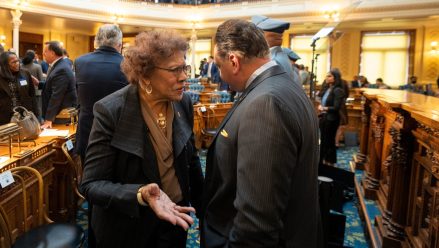Kalshi has self-certified parlays on political or economic outcomes and may soon start offering those bets, a new filing with the Commodity Futures Trading Commission (CFTC) shows.
The prediction market filed a notice to self-certify a new contract Monday, based on a template market name. The market is named “Will <political and economic outcomes> occur in <events>?”
ptc11242533111Self-certification is a process in which a CFTC-registered exchange tells the regulator that it plans to list a new contract. If the CFTC does not object, the contract can be listed as soon as the end of the business day.
That template is similar to the name used when Kalshi self-certified sports parlays, under the market name “Will <outcomes> occur in <events>?”
Further details of market rules make clear that the new contract refers to a parlay. The filing says that the market will be settled based on “the resolution of each <component>.”
Possible subjects of the new parlays, Kalshi’s filing said, include “election results, appointment confirmations, legislative votes, executive orders, treaty ratifications, economic data releases meeting specified thresholds, central bank decisions, regulatory actions, international agreements, referendum results, cabinet changes, and policy announcements.”
That would allow traders to bet on, for example, a contract that pays out if the Federal Reserve cuts interest rates and inflation subsequently rises above 3% the next month.
Currently, based on the rules of the contract, it does not appear possible to combine a political and sports event into a single parlay.
Contracts can be offered immediately
The self-certification filing says that Kalshi could start offering the contracts after close-of-business on Nov. 24. Exchanges often choose an earlier date on their self-certification filing than the actual date the contracts launch.
As of noon Tuesday, the contracts were not listed on Kalshi’s site or its app.
Kalshi’s build-your-own parlays feature for sports was quietly made available through its API for days before it became a feature on the prediction market’s app.
The CFTC is able to launch a 90-day review into any self-certified contract if the commission deems it to be against the public interest, and it can block the contract after review. However, in practice, it has not exercised the right this year, and given that it did not do so for sports parlays, it appears unlikely that the CFTC would block political parlays.
Kalshi RFQ process
User-built parlays on Kalshi are completed through a request-for-quote (RFQ) process. In this process, a user builds a bet, and it is then offered to traders that have enabled RFQs and are using the Kalshi API to trade. Those API users with RFQs enabled are largely market makers who are incentivized to provide trade offers.
The market makers can suggest a price to the original trader, who can then choose to accept the bet at that price.
Even smaller market makers mostly find Kalshi’s system for pricing sports parlays challenging to operate. Earlier this month, Kalshi made a change to its API, allowing traders to filter out parlays, as otherwise the large number of different markets created in the build-up to a game can flood the API.
Polymarket approved to partner with FCMs
Elsewhere, the CFTC has approved Polymarket to partner with futures commission merchants (FCMs). They can partner with an exchange to offer users access to contracts made by that exchange.
Polymarket announced a partnership with daily fantasy operator PrizePicks, which is already registered as an FCM, earlier this month. PrizePicks said it would offer Polymarket contracts once the platform launches in the U.S. Days later, PrizePicks announced that it would also offer its users access to Kalshi contracts.
Polymarket has still not launched in the U.S. or announced a date to do so. A beta test version of the Polymarket trading API is available to some traders.







